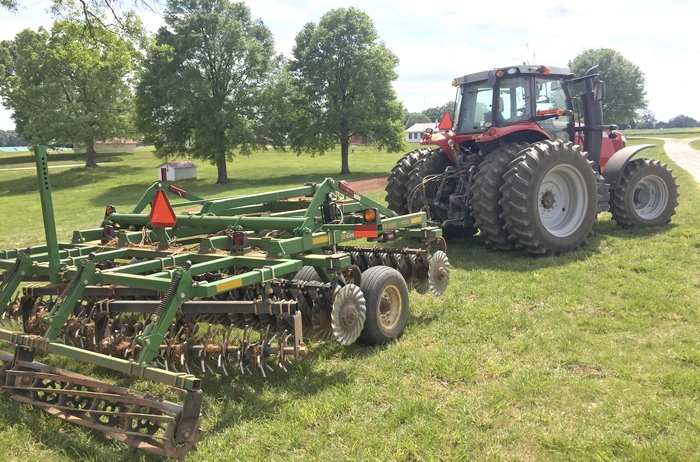Research Station studying wheat, tilling and barley
Published 12:00 am Friday, April 29, 2016

- Hunter Barrier/Piedmont Research Station Vertical tillage equipment.
By Amy-Lynn Alberston
For the Salisbury Post
Last week the Piedmont Research Station hosted the Small Grains Field Day. Farmers, Extension agents and sales people from across the Piedmont came to Rowan County to hear about the latest research in growing wheat for North Carolina. While there are several other crops that make up small grains, Wheat was the grain of the day.
The type of wheat grown in our area is a soft winter wheat that will usually end up in livestock feed. Hard winter wheat is what is milled and used in bread and other baked goods. Most hard winter wheat is grown in the Midwest.
The Piedmont Research Station participates in an Official Variety Trail or OVT every year. Researchers from North Carolina State University are looking for varieties of hard winter wheat that are resistant to the plethora of diseases that come with our roller coaster weather in the Piedmont.
In soft winter wheat, the goal is higher yields and less input from the farmer. You can find the results of the OVT on the NCSU small grains website, http://www.smallgrains.ncsu.edu/.
The NCDA & CS Piedmont Research Station works closely with Cooperative Extension and helps our agents get the best information out for our growers. Extension agents from several counties work together on a three-acre block of wheat that they will keep data on and enter the yield in the annual yield contest.
This information has helped Extension create the beginnings of a new application that farmers hopefully will be able to use in their tractors or on their phones, which will help them make economic decisions about their crops.
Another long-term research project that has just begun at the station is a study on no till vs. light vertical tillage vs. aggressive vertical tillage.
What in the world? So no till is a practice that has been around for decades. No-till is a way of growing crops or pasture from year to year without disturbing the soil through tillage. No-till increases the amount of water that infiltrates the soil and increases organic matter and nutrients in the soil.
In many agricultural regions it can reduce or eliminate soil erosion. It increases the amount and variety of life in and on the soil, including disease-causing organisms and disease suppression organisms. The most powerful benefit of no-tillage is improvement in soil biological fertility, making soils more resilient.
Farm operations are made more efficient, particularly improving the time of sowing and better trafficability (machines or livestock do not do damage to the soil) of farm operations. The great majority of row crops are farmed on no-till systems.
Vertical tillage is when the farmer very lightly tills the soil without removing the residue left by the previous crop. The theory behind this new technique is that if you lightly till the soil, you will be able to achieve a more uniform stand, and therefore higher yields.
The Piedmont Research Station is in the first year of a 10-year study to see how vertical tillage impacts yield, and more importantly, how it impacts the overall soil health. Most vertical tillage tools are very heavy, require a lot of horsepower to function properly, and have a fairly hefty price tag, as well. This is just another example of how research can give us immediate and long-term data that can be used to help farmers make the best decisions for their farms.
In addition to the wheat, researchers are also looking at barley as a crop with more potential in North Carolina. Traditionally malting barley is grown in the high plains and northwestern states. With the growth of the microbrewery industry and the demand for locally grown, barley may be something our farms can produce on a larger scale.
N.C. State researchers are looking for varieties of two-row and six-row barley that will tolerate our weather conditions and still produce a quality grain for feed and for malting.
It’s exciting to see how research is done and how quickly the information is collected and distributed to those who need it most. For more information on small grain production or other agricultural topics, please contact the Rowan County Extension Center at http://rowan.ces.ncsu.edu or 704-216-8970.




